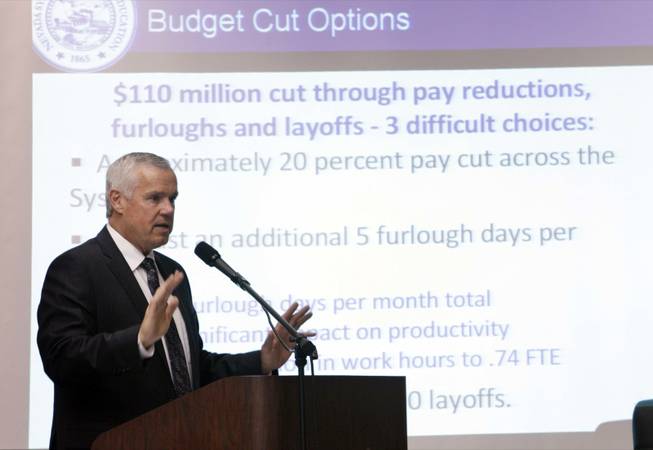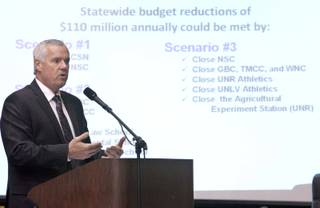
Chancellor Dan Klaich outlines possible budget-cutting options during a special budget meeting of the Board of Regents at the College of Southern Nevada, Feb. 2, 2010. The Nevada System of Higher Education is facing a $37 million reduction in state funding as of March 1, and $110 million for the 2011 fiscal year.
Published Tuesday, Feb. 2, 2010 | 10:56 a.m.
Updated Tuesday, Feb. 2, 2010 | 12:29 p.m.
Sun Coverage
Sun Archives
- Higher education faces greatest financial state of emergency in decades (2-2-10)
- With state cuts, how long can teacher salaries be spared? (1-26-10)
- Gibbons to call special session, lawmakers plan public meetings (1-25-10)
- New economic reality: Pessimism (1-23-10)
- State budget comes up $800 million short (1-22-10)
- Forecast: Economy will begin to rebound in mid-2011 (1-22-10)
- Gibbons’ no-talk order further divides branches (1-22-10)
- Special session may require help of state Supreme Court (1-10-10)
- College students band together, rally against budget cuts (1-22-2009)
- Chancellor calls Nevada schools a ‘disaster’ (1-22-2009)
- UNLV fundraising campaign falls short, so deadline extended (12-18-2008)
- Emotional farewells at Regent’s meeting (12-5-2008)
- Rogers to budget cut protestors: Glad you’re here (12-4-2008)
- Fee hikes may become too steep to endure (12-4-2008)
- UNLV fundraisers fighting to the finish (9-1-2008)
- With that pay, no way, many would-be graduate students tell UNLV (5-11-2008)
- Some say setting fees every two years gives universities a blank check (2-16-2008)
Beyond the Sun
The proposed cuts to Nevada’s public colleges and universities represents an “unwinding of almost a decade of significant progress in higher education,” Chancellor Dan Klaich said at today’s special budget meeting of the Board of Regents. “And we’re being asked to do it in a few weeks.”
But Klaich said while increasingly dire projections are being handed down from Carson City, higher education must guard against reacting too hastily.
The regents are meeting to review the findings of the Economic Forum, which estimates revenue flowing to the state. Also on the agenda was discussion of the possibility of declaring what’s known a financial exigency, which means there isn’t enough money in the system to meet expenditures.
The regents can only vote on such action after a recommendation from the chancellor with input from the council of campus presidents.
The last time the issue was discussed was in 1982, although the step wasn’t taken.
Klaich said the higher ed’s prospects won’t be hurt by waiting until the Legislature meets in a special session before regents decide whether a financial exigency needs to be declared.
“The situation is not made materially better or worse with the passage of a short period of time as we watch what happens with the governor and the Legislature,” Klaich said.
An overarching goal needs to be preserving the existing code that governs the system and doing as little harm as necessary, said Regent Michael Wixom.
James Dean Leavitt, chairman of the Board of Regents, said he has asked staff to prepare the paperwork for declaring a financial exigency so that is ready, if needed, at the March meeting.
Today's meeting drew such a large audience at the College of Southern Nevada's West Charleston campus that an overflow room was set up.
The Nevada System of Higher Education is facing a $37 million reduction in state funding as of March 1, and $110 million for the 2011 fiscal year.
The $110 million cut equals a 29.4 percent reduction in funding from the higher ed budget approved by lawmakers during the 2009 session.
To meet the $110 million in cuts by the projected March 1 deadline, Klaich said the Board of regents could choose from three scenarios:
*A 20 percent pay cut across the system.
*At least five additional furlough days per month for employees.
*Laying off 1,290 employees.
During the winter break, Klaich said he met with the presidents of the colleges and universities and encouraged them to prepare reports outlining the impact of budget cuts of 8 percent, which was what was considered a reasonable estimate at the time of what the governor would be asking of higher ed.
But then the Economic Forum met Jan. 22, and “I think our collective breath was taken away, and our planning to date became moot, on that terrible Friday afternoon,” Klaich told the regents.
The revenue shortfalls that are now being projected are nothing short of staggering, Klaich said.
Higher ed has already seen its share of state funding dramatically trimmed, resulting in layoffs across the system, larger class loads for faculty, increased job duties for fewer support staff and thousands of students being turned away because of a lack of available classroom seats, including upward of 5,000 at College of Southern Nevada.
“We are not sitting here before you talking about cuts from whole cloth,” Klaich said. “The cloth is tattered and has holes at this point.”
Declaring a financial exigency would give individual campuses more freedom in reducing personnel costs because existing contracts could be more easily adjusted. It would also allow higher ed administration to operate on an accelerated timeline, bypassing existing requirements for notifying employees and students of possible changes.
To illustrate the size of the budget hole, while emphasizing he wasn’t actually advocating such drastic action, Klaich said the $110 million shortfall could also be met by shutting down entire campuses and programs, with three scenarios of combinations:
*Closing College of Southern Nevada and Nevada State College.
*Closing Great Basin College, Truckee Meadows Community College, Desert Research Institute, University of Nevada School of Medicine as well as Boyd School of Law and UNLV’s dental school.
*Closing Nevada State College, Great Basin College, Truckee Meadows Community College, Western Nevada College, and eliminate UNR and UNLV Athletics and the Agricultural Experiment Station at UNR.
Cutting $110 million from the budget will mean an estimated 15,750 students would be unable to enroll in the Nevada System of Higher Education, a decrease of 14 percent from 2009’s enrollment, Klaich said. And more than 1,000 full-time faculty and staff would lose their jobs.
“We will lose our competitive edge … and add to the already crushing burden of unemployment in this state,” Klaich said. “We will lose the ability to train the workforce for the very economy we wish to attract this state.”


Join the Discussion:
Check this out for a full explanation of our conversion to the LiveFyre commenting system and instructions on how to sign up for an account.
Full comments policy